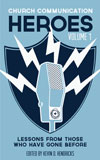Some will say 20th Century Christianity was saved by C.S. Lewis. Others will claim Billy Graham. But for me, that person will always be G.K. Chesterton. Dubbed the “prince of paradox,” this English writer spoke to a progressive Christian paradigm long before it was cool to call yourself “postmodern.”
Like other apologists, Chesterton demonstrated that a person can be both a Christian and an intellectual—and for that I am grateful. But don’t take my word for it; see the genius of the man for yourself.
Chances are, if you’re like me, you’re familiar with some of the bigger-name authors in contemporary Christianity (Philip Yancey, Tim Keller, Anne Lamott, and so on). But you may not have familiarized yourself with a Catholic literary critic who wrote short stories about a crime-solving priest named Father Brown.
5 Lessons for Communicators
What can this columnist, journalist, and novelist teach us about church communications? Quite a lot, actually. Here are five important lessons Chesterton’s legacy has left us:
1. Don’t avoid politics.
Despite what you grew up hearing, it’s good to mix politics and religion. In fact, you can’t separate the two. Your political views will affect your faith and (hopefully) vice versa. Chesterton knew this and didn’t bother trying to hide it.
2. Embrace controversy.
Never one to shy away from a debate, he relished the opportunity to share his core beliefs and even question those of others. He wasn’t concerned with political correctness or avoiding criticism. At the same time, he didn’t demonize his opponents, either. There was always an air of good, British cordiality and respect—with, of course, a dash of brutal honesty.
One of his most famous opponents was his “frenemy” George Bernard Shaw, whom he spoke about (and criticized) at length in his book Heretics: “If man, as we know him, is incapable of the philosophy of progress, Mr. Shaw asks, not for a new kind of philosophy, but for a new kind of man.”
3. Stand your ground.
Chesterton cared about what he believed in (politics and all) and wasn’t afraid to put a philosophical stake in the ground. At the same time, he was open to friendly discourse and public correction. In other words, he didn’t only dish it out; he took it, as well.
4. Show a little snark.
A dying art in modern literature and philosophy is the use of satire. However, in previous eras, this was a primary tool of persuasion for many writers who had a message to share. Good old Gilbert was better than most at this, using subtle forms of sarcasm to back up a claim or convince his readers of his point of view.
5. Be eccentric.
Chesterton had an usual style of proving his point, often turning arguments on their head to prove the opposite was true. He did this not with deep theological vocabulary, but by using relevant literary figures and popular culture references. He wrote about important, timely topics, but did so in a light, engaging way.
He also wore a cape most of the time. Compare that to the V-necking wearing crowd of many modern megachurches and draw your own conclusions.
Suffice to say, Chesterton didn’t have a problem sticking out like a sore thumb. He often got lost and had to call his wife for directions home. Yet, despite (or perhaps because of) his idiosyncrasies, he was one of the greatest minds in church history. In fact, maybe being a little weird is the greatest takeaway he’s left us.
We’re stoked to have Jeff Goins writing for us again. Today he happens to be releasing his new book, Wrecked: When a Broken World Slams Into Your Comfortable Life. Check it out.
 More:
More:
- Learn more about heroes in our ebook, Church Communication Heroes Volume 1: Lessons From Those Who Have Gone Before.
- Check out other heroes in our Church Communication Heroes series.





Joe Wickman
August 15, 2012
So, I’m going to confess that I’ve only ever read quotes of Chesterton, and never an entire work.
If you could pick only one to start with, what would it be?
Josh Schuler
August 16, 2012
no brainer….Orthodoxy.